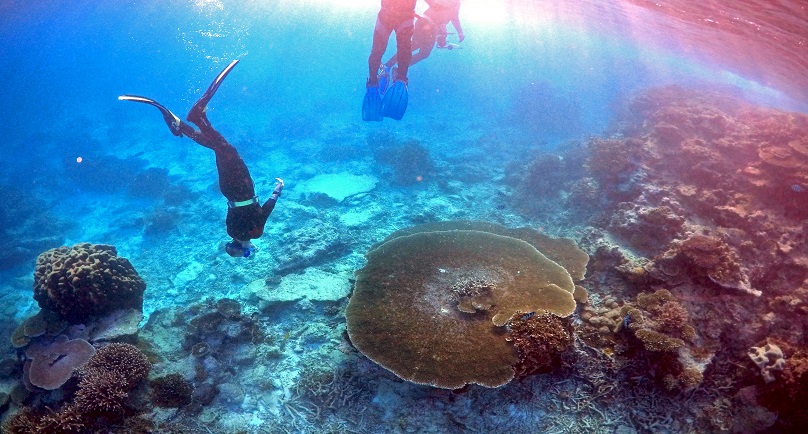Image: Peter Gash (L), owner and manager of the Lady Elliot Island Eco Resort, snorkels with Oliver Lanyon and Lewis Marshall, Senior Rangers in the Great Barrier Reef region for the Queensland Parks and Wildlife Service, during an inspection of the reef’s condition in an area called the ‘Coral Gardens’ located at Lady Elliot Island in Queensland, Australia, June 11, 2015. REUTERS/David Gray/File Photo
By Colin Packham
SYDNEY (Reuters) – Australian scientists said on Wednesday that just seven percent of the Great Barrier Reef, which attracts around A$5 billion ($3.90 billion) in tourism every year, has been untouched by mass bleaching that is likely to destroy half the coral.
Bleaching occurs when the water is too warm, forcing coral to expel living algae and causing it to calcify and turn white. Mildly bleached coral can recover if the temperature drops, otherwise it may die.
Although the impact has been exacerbated by one of the strongest El Nino weather systems in nearly 20 years, scientists believe climate change is the underlying cause.
“We’ve never seen anything like this scale of bleaching before. In the northern Great Barrier Reef, it’s like 10 cyclones have come ashore all at once,” said Professor Terry Hughes, conveyor of the National Coral Bleaching Taskforce, which conducted aerial surveys of the World Heritage site.
“Our estimate at the moment is that close to 50 percent of the coral is already dead or dying,” Hughes told Reuters.
The Great Barrier Reef stretches 2,300 km (1,430 miles) along Australia’s northeast coast and is the world’s largest living ecosystem.
“There were some who said that the worst had passed. We rejected that, and they were wrong,” Environment Minister Greg Hunt told reporters. “Let it be known that this is a significant event. We take it’seriously.”
U.S. President Barack Obama embarrassed Australia 18 months ago by warning of the risk of climate change to the reef during a G20 meeting.
UNESCO’s World Heritage Committee last May stopped short of placing the Great Barrier Reef on an “in danger” list, but the ruling raised long-term concerns about its future.
Australia is one of the largest carbon emitters capita because of its reliance on coal-fired power plants for electricity.
Despite pledging to cut carbon emissions, Australia has continued to support fossil fuel projects, including Adani Enterprises Ltd’s proposed A$10 billion ($7.7 billion) Carmichael coal project in the Galilee Basin in western Queensland.
“It’s not good enough for them to say they care about the reef while they keep backing the coal industry and avoid tackling climate change,” said Shani Tager, a Greenpeace campaigner.
The findings will likely place pressure on Prime Minister Malcolm Turnbull ahead of an expected federal election on July 2.
Turnbull is an advocate of carbon trading and supports progressive climate policies, but has left some disappointed over a failure to strengthen his party’s commitment to addressing climate change.
($1 = A$1.28)
(Additional reporting by James Regan; Editing by Nick Macfie)
Copyright 2015 Thomson Reuters. Click for Restrictions.


